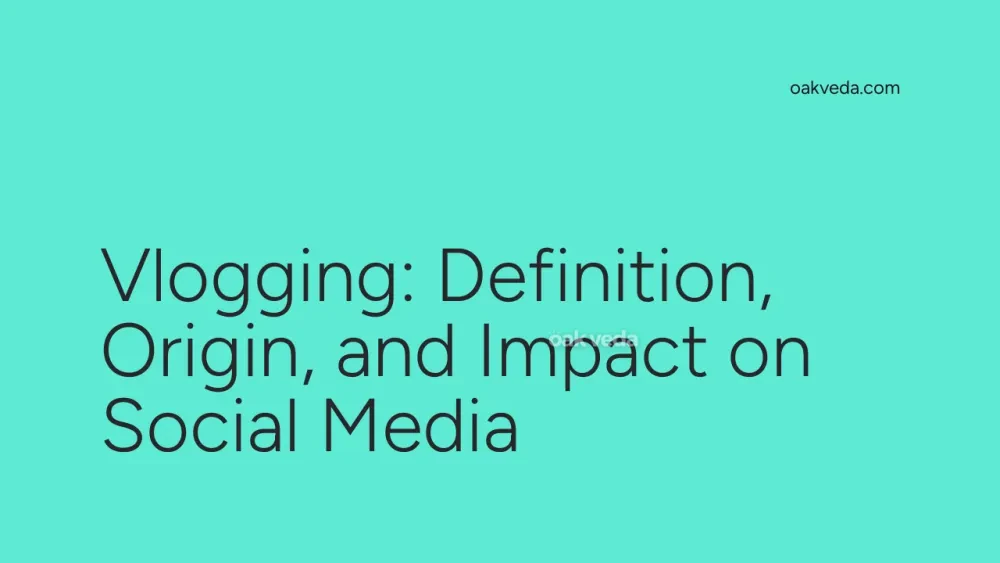
What is Vlogging?
Vlogging, short for video blogging, is a form of content creation where individuals share their thoughts, experiences, and stories through video format. A vlog (video blog) is the visual counterpart to a written blog, allowing creators, known as vloggers, to connect with their audience more personally and dynamically.
Origin and Development of Vlogging
The concept of vlogging emerged in the early 2000s with the rise of video-sharing platforms. However, it gained significant traction with the launch of YouTube in 2005. As technology advanced and smartphones became ubiquitous, vlogging evolved from a niche hobby to a mainstream form of content creation and consumption.
How Vlogging Works
Vlogging typically involves the following steps:
- Content Planning: Vloggers brainstorm ideas and plan their content.
- Recording: Using cameras or smartphones, vloggers film their content.
- Editing: Raw footage is edited to create engaging, polished videos.
- Publishing: Finished vlogs are uploaded to platforms like YouTube, TikTok, or Instagram.
- Promotion: Vloggers share their content across social media to increase visibility.
- Engagement: Creators interact with viewers through comments and community posts.
Types of Vlogs
Vlogging encompasses various genres and styles, including:
- Daily Vlogs: Documenting day-to-day life
- Travel Vlogs: Showcasing destinations and travel experiences
- Beauty and Fashion Vlogs: Tutorials, reviews, and style advice
- Tech Vlogs: Reviews and discussions about technology
- Fitness Vlogs: Workout routines and health tips
- Food Vlogs: Cooking tutorials and restaurant reviews
Popular Examples of Vloggers
Some well-known vloggers who have made significant impacts include:
- Casey Neistat: Known for his creative storytelling and cinematic style
- Jenna Marbles: Pioneered comedy vlogging
- PewDiePie: Built a massive following through gaming vlogs
- Zoella: Gained popularity with beauty and lifestyle content
Impact of Vlogging on Social Media Culture
Vlogging has revolutionized social media culture in several ways:
- Authenticity: Vlogs offer a raw, unfiltered glimpse into creators' lives.
- Community Building: Vloggers foster strong connections with their audience.
- Democratization of Content: Anyone with a camera can become a content creator.
- Influencer Marketing: Vloggers have become powerful marketing channels for brands.
- Entertainment Shift: Vlogs compete with traditional media for viewers' attention.
Controversies Surrounding Vlogging
While vlogging has many positive aspects, it's not without controversies:
- Privacy Concerns: Oversharing personal information can lead to security risks.
- Mental Health Issues: The pressure to constantly create content can be stressful.
- Authenticity vs. Sponsorship: Balancing genuine content with sponsored posts can be challenging.
- Child Safety: Concerns about children's privacy and exploitation in family vlogs.
How Brands and Influencers Use Vlogging
Brands and influencers leverage vlogging for various purposes:
- Product Reviews: Showcasing products in real-life situations
- Behind-the-Scenes Content: Offering exclusive looks into businesses or events
- Tutorials: Demonstrating how to use products or services
- Brand Storytelling: Creating narrative-driven content to connect with audiences
- Influencer Collaborations: Partnering with vloggers to reach new demographics
Future Trends in Vlogging
The vlogging landscape continues to evolve:
- Short-Form Content: Platforms like TikTok are driving a shift towards shorter vlogs.
- Virtual Reality: Immersive VR vlogs may become more prevalent.
- Live Streaming: Real-time interaction is becoming increasingly popular.
- Niche Content: Highly specialized vlogs are finding dedicated audiences.
- AI and Automation: Tools for easier editing and content creation are emerging.
FAQs about Vlogging
-
What equipment do I need to start vlogging? To begin, you'll need a camera (smartphone or dedicated camera), a microphone for clear audio, and basic editing software.
-
Can vlogging be a full-time career? Yes, many successful vloggers earn a living through ad revenue, sponsorships, and merchandise sales.
-
How often should I post vlogs? Consistency is key. Many vloggers aim for weekly uploads, but find a schedule that works for you and your audience.
-
How do I grow my vlogging audience? Focus on creating quality content, engage with your viewers, collaborate with other creators, and promote your vlogs on various social media platforms.
-
Is it too late to start vlogging? It's never too late! While the market is competitive, there's always room for unique perspectives and fresh content.
Vlogging has transformed the way we create and consume content online. As technology advances and audience preferences evolve, vlogging will continue to play a significant role in shaping digital culture and communication. Whether you're a aspiring creator or a curious viewer, understanding the world of vlogging opens up exciting possibilities for connection and creativity in the digital age.
You may be interested in:
- Ded: Definition, Origin, and Impact on Social Media
- Instagram Algorithm: Definition, Origin, and Impact
- Link in Bio: Definition, Origin, and Impact on Social Media
- Touch Grass: Definition, Origin, and Impact on Social Media
- ION: Definition, Origin, and Impact on Social Media
- Gen Z: Definition, Origin, and Impact on Social Media

